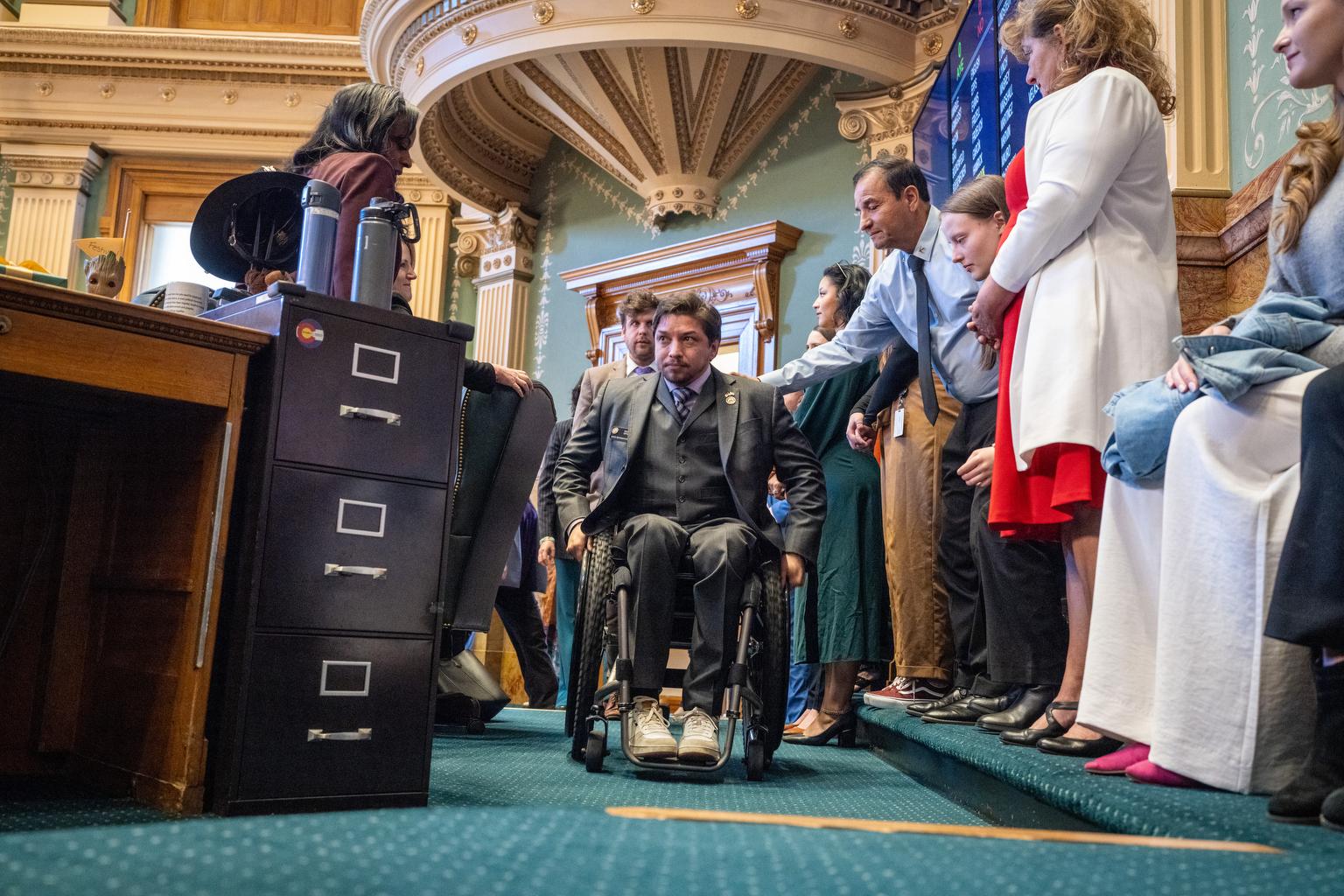
Democratic state Rep. David Ortiz made history four years ago when he became Colorado’s first lawmaker to use a wheelchair. Now, after two terms, Ortiz has decided to hit pause on his political career and is not seeking reelection.
His presence at the statehouse gave disability rights issues a whole new prominence and was felt even before he was officially sworn into office.
His election led to changes to the 130-year-old capitol building, such as adding a ramp, widening doorways and modifying a desk on the House floor so his wheelchair could fit underneath it. A few years later the state added a lift so Ortiz could reach the most prominent place in the House chamber: the speaker's podium. That way he could take a turn presiding over debates.
“It absolutely has been transformative physically,” said Democratic Rep. Meg Froelich. “We have the access that we should have had decades ago, the physical access.”
His influence was felt beyond the physical changes. During his four years in the House, Ortiz made it his focus to strengthen discrimination protections for violations of the Americans with Disabilities Act and reshape access to everything from government buildings and housing to the great outdoors.
He spearheaded several successful bills, including ensuring government websites comply with the American Disabilities Act. Another law expands insurance coverage for prosthetics for youth in sports. He sponsored a law to give people the right to repair their own wheelchairs. This session a top priority that he was instrumental in seeing passed was the creation of the Colorado Disability Opportunity Office.
“I was a lobbyist for veterans before I ran for office, and I maybe saw at any given year during that time, zero to three bills around disability rights,” said Ortiz. “We had over 15 run this year, over 15. That is wild to think about.”
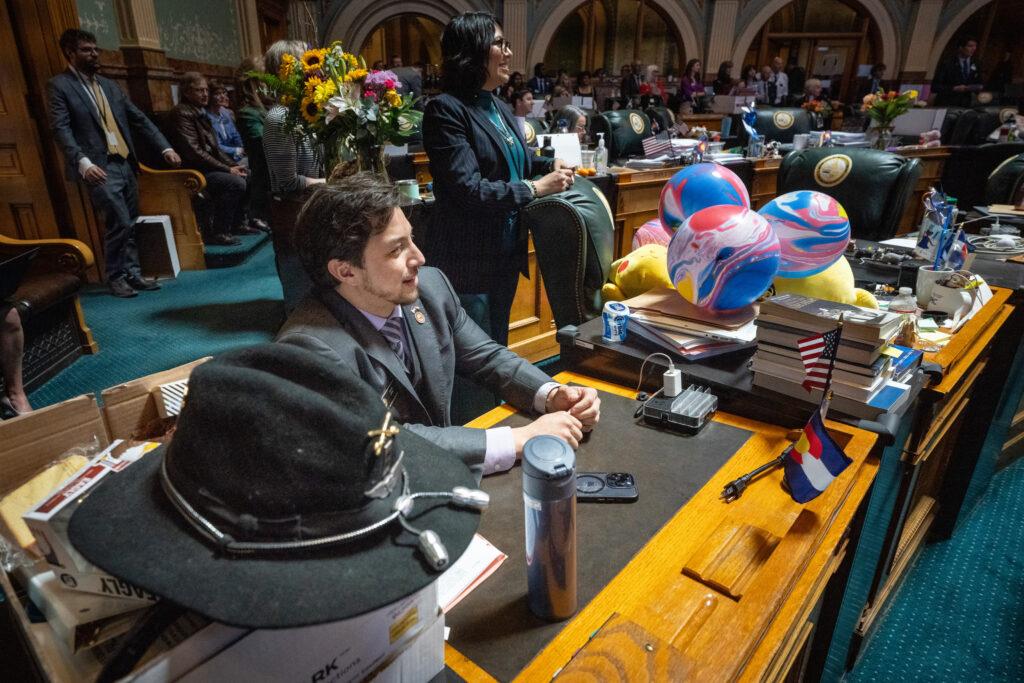
Democratic Sen. Jessie Danielson has worked on many bills with Ortiz over the years.
“The amount of policy that is what should have been done a long time ago, and the rapid fashion that he was able to achieve that. All a credit to him for sure,” said Danielson. She added Ortiz is a hard worker, smart, dedicated and talented. “But yes, being part of the community, it makes a difference.”
However, some of his most consequential legislative proposals didn’t make it across the finish line, including a bill last session that would have made it easier to file a disability rights discrimination lawsuit and potentially increase the penalties for entities found in the wrong. A measure to require the construction and design of more apartments for people who use wheelchairs also failed. And this session his bill to increase accessibility at DIA passed, but stripped the right to sue, which would have served as the enforcement mechanism.
'Together, we're a force' | An influence on how legislation is considered
Ortiz served as an Army pilot in Afghanistan, where a catastrophic helicopter crash left him paralyzed from the waist down. Republican Rep. Richard Holtorf, a fellow Army veteran, who also flew helicopters and served in combat, said it’s a bond they share and value. Holtorf added despite their political differences, he considers Ortiz a brother-in-arms.
“We can talk about our time in the military and our combat experiences and have great conversations, but then we move to politics and that's where we start to have some friction points,” said Holtorf. “There's a lot of things that we do agree upon, but there's other things that we don't and we try to talk those out.”
Their most public fissure occurred during a heated discussion on the House floor in 2021. Holtorf called Ortiz "Buckwheat," a racist term based on a caricature of a Black character from an early 20th-century television show. The incident rapidly became national news. Ortiz, who is Latino, reached out to Holtorf to talk, and a few days later they headed to the cigar bar at the Brown Palace Hotel.
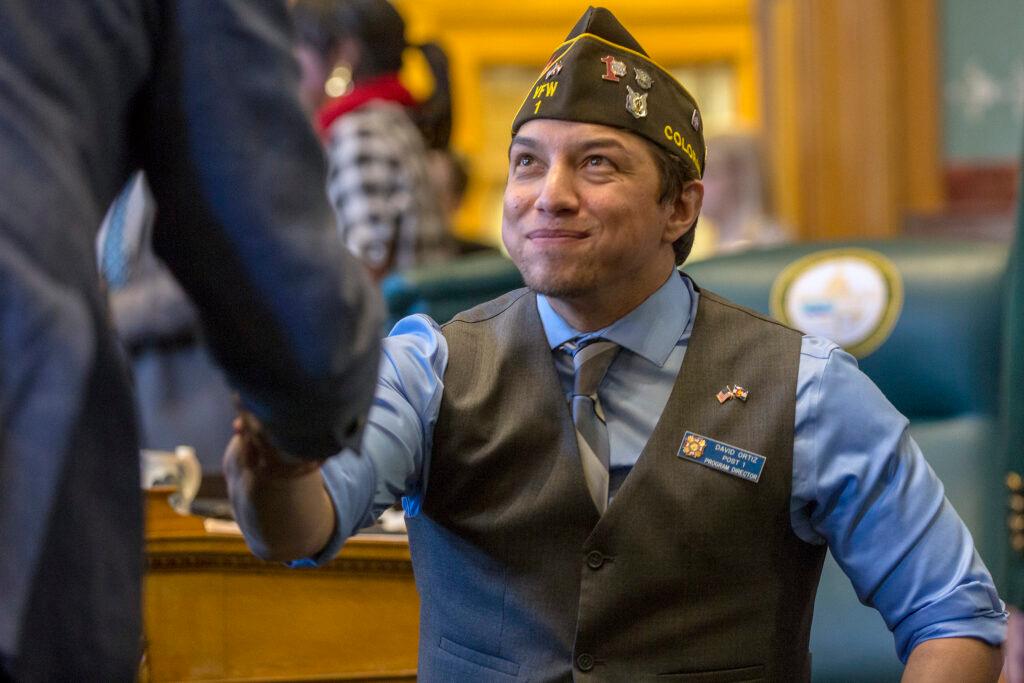
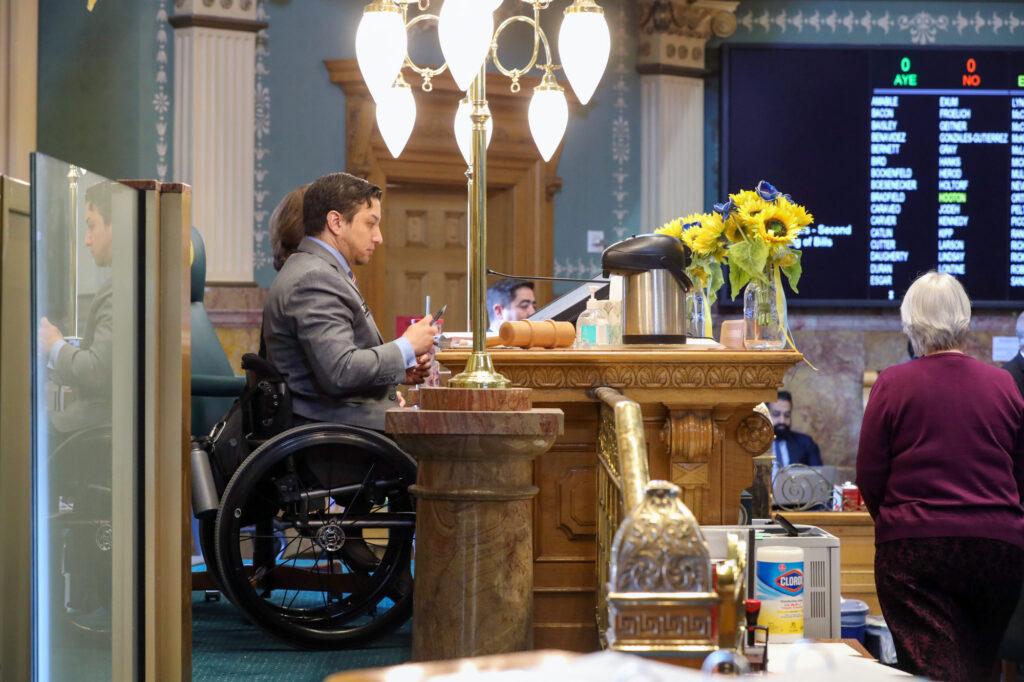
Holtorf apologized and said he did not know the racial history or context behind the term "Buckwheat," but acknowledged he never should have used a pejorative nickname with Ortiz.
Holtorf said throughout it all Ortiz continues to be a champion for the disability community and highlights all of the things that still need to be remedied.
“I think there's still many advocates in the space, but they will lose the only disabled veteran legislator, and that is irreplaceable,” the Republican said.
First-year lawmaker Manny Rutinel, a Democrat, said Ortiz’s influence extended beyond bills specifically about disability rights, and actually changed how Rutinel approaches all legislation he’s considering under the gold dome.
“Every time I propose a bill, no matter what it's about, there's a voice in my head and that voice is Representative Ortiz's voice telling me, ‘What about the disability community?’,” Rutinel said. “And that's the kind of zealous advocacy that is so rare, but so powerful once you see it.”
Rutinel said had Ortiz not been a member of the legislature there’s “not a chance” he would have thought of his own bills through the lens of disability rights. This session Rutinel was a main sponsor of a proposal Ortiz tried to pass before that would require local governments to stream public meetings to increase accessibility.
It failed due to a high projected cost but Rutinel plans to introduce it again next year.
“The attitude of my colleagues and them going off and running their own bills around disability rights has been humbling, has been heartening. It's been amazing to see,” Ortiz said.
He’s long talked about the added pressure, challenge, and responsibility that comes with being Colorado’s first lawmaker to use a wheelchair.
“I came to this work with a lot of internalized ableism," Ortiz said. "It was, ‘I'm going to climb those stairs even though the lift is broken, in my wheelchair. I'm going to do this’, or ‘I'm going to adapt,’ or ‘I'm going to do that.’ And it took me finding my community and understanding that, no, that's not what I need to be doing.”
Ortiz’s intern this session, Frank Kane, said it’s the first time he’s had a boss with a mobility disability. Kane, who was born with cerebral palsy and walks using forearm crutches said it’s been a huge load off mentally and emotionally to not be the only one in a workplace with a physical disability.
“You realize just how much more we can accomplish together as a disability community,” said Kane. “I mean, it sounds cliche, but it's true. Together, we're a force.”

The Colorado Cross Disability Coalition and other advocates are working to recruit more people with disabilities to run for office. Julie Reiskin heads the organization and has lobbied at the capitol for 30 years. She said Ortiz’s example helped that effort and showed their community this can be done.
“I think it got people more excited about participating in the public policy space,” she said.
And she wants to ensure the urgency Ortiz brought to disability rights policy at the statehouse doesn't fade away after he’s gone.
“It got our issues visible in a way that they hadn't been before,” Reiskin said. It also gave them a voice during floor debates and caucus discussions.
“Because he was there, there was always our presence, our presence never left. And that's what was different than it ever has been,” she said.
Jack Johnson, the public policy liaison with Disability Law Colorado agrees.
“His persistent and relentless advocacy has shaped the lives of hundreds of thousands of Coloradans living with a disability. Not only was he a leader in the movement, but he brought the spirit and the fire that helped ignite the hearts of so many of his colleagues.”
As for Ortiz, he said his advocacy for the disability community won’t end.
“It's just going to take a different form, and I'm looking forward to the next chapter, which is hopefully starting a family and spending time with my own.
He said he hopes his election helped pave a path for the next person.
“Making sure that even though I'm the first wheelchair user here, that I'm not the last.”
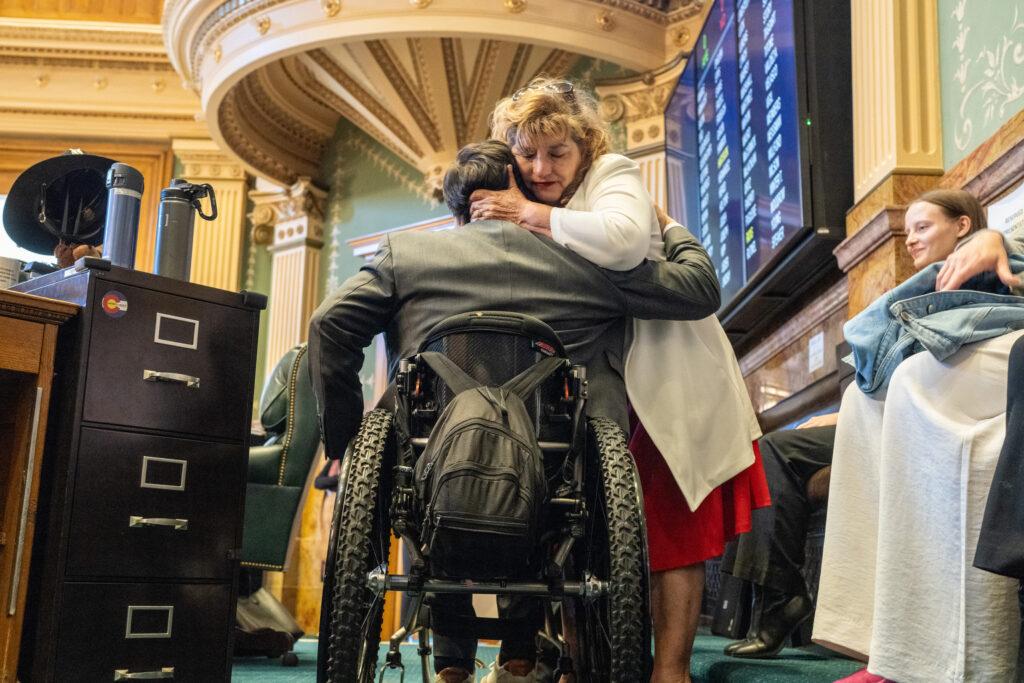
Disability rights bills that passed during the 2024 legislative session
- Accessibility standards for electric vehicle charging stations and a requirement that car ride-sharing services indicate a vehicle’s accessibility modifications.
- The creation of the Colorado Disability Opportunity Office, to be housed in the Colorado Department of Labor and Employment. The office’s goal is to work to ensure that full societal inclusion for those living with disabilities is met, including providing resources when there are issues in the state, to research, coordination and recommendations for policy changes.
- Airport accessibility requirements at DIA to include more transparency and tracking of accessibility issues, more input from the disability community on new construction of walkways, one public accessible restroom in each terminal and new companion care changing tables in new restrooms, and additional training for airport staff.
- Banning a landlord from requiring as part of a lease that a renter with a disability must undo any “reasonable changes” the renter made to the property when the lease is up or not renewed.
- A bill that seeks to preserve the caucus process as the most accessible way for candidates with disabilities to get on the ballot. Any attempt to remove the caucus option would constitute discrimination against those living with a disability.
- A bill that puts more guidelines on how schools use shortened school days for students with disabilities, and the impact it has, including for participation in field trips and extracurricular activities.
- Making it easier for those with disabilities to get testing accommodations on a licensing exam. It would not require a diagnostic test as long as they’d previously received accommodations on another high-stakes test.
- A bill that makes some changes to workers' compensation disability benefits and adds the loss of an ear to the list of permanent impairment benefits.
- Making prescription drug information more accessible. The bill requires pharmacies to make it easier for those who are blind or visually impaired to get their prescription information, including providing it in braille if needed, or with electronic labels that sync with audio readers.
- Asking the Colorado Department of Education’s State Library to expand on-demand audio news for people who are blind or visually impaired increases how many of those people are aware of the service.
- A bill to expand warrant of habitability provisions in rental agreements, which are implicit guarantees that a residential property is fit for human habitation. The bill prohibits landlords from retaliating if a renter seeks modifications. It specifies that an inoperable elevator for a renter with a disability who is unable to use the stairs would constitute an uninhabitable condition. It allows tenants to sue for unlawful removal or eviction or to break a lease early if repairs or modifications aren’t timely.
- A bill to expand eligibility for participation in juvenile and adult diversion programs and prohibit a juvenile diversion program from denying services based on a person’s intellectual or developmental disability among other things.
- A proposal that requires the Colorado Department of Education to create a training program with easy-to-understand explanations of individualized education programs, including state and federal laws.
- A proposal that changes the adult competency process, including clarifying who raises the competency question in parole hearings.
- A bill to increase wraparound services for those in the criminal justice system who are eligible for mental health services in an effort to reduce the competency waitlist.









